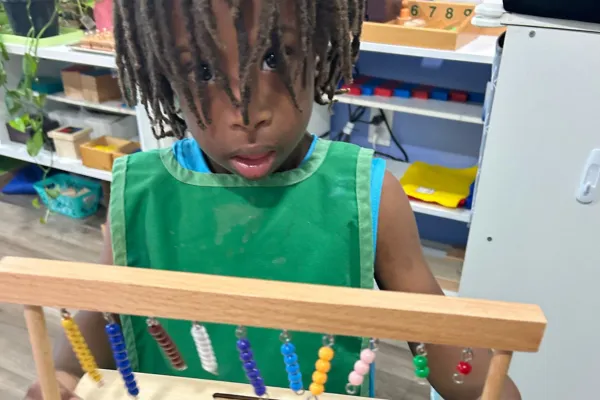
Building Strong Math Foundations Through Hands on Activities
Introduction
In Montessori classrooms, math is much more than rote memorization or worksheets. It’s a hands-on, sensory experience where children interact with materials to truly understand mathematical concepts. Montessori math materials introduce abstract ideas in a tangible way, helping children grasp essential skills like counting, number sense, and problem-solving at their own pace.
Hands-On Learning with the Short Bead Stairs
The cover photo features a child holding the Short Bead Stairs. These colorful beads give children a tactile experience as they explore quantities from 1 to 9. By physically handling the beads, children internalize the concept of increasing numbers and begin to see the relationships between them. This early exposure to counting sets the stage for more complex operations in later years.
Learning Numeracy Through the 100 Board and Number Rods
In the next set of photos, two critical Montessori math tools are being used. On the left, a child is working with the 100 Board, reinforcing their understanding of numerical order and counting to 100. The methodical layout of the board strengthens the child’s ability to recognize patterns in numbers.

On the right, two children are working with the Red and Blue Number Rods. These rods help with understanding number value, sequence, and comparison. The child guiding the other in this photo is not only reinforcing their own understanding but also developing leadership skills—a wonderful cross-curricular benefit of Montessori education, where collaboration plays a key role in learning.
Matching Numbers and Quantities: Real-World Connections
In the final photo set, a child is seen matching quantities to corresponding numbers. This tactile activity allows them to connect abstract numbers with physical objects, reinforcing the concept that numbers represent real things. In the image on the right, a child is using pumpkins for 1-to-1 correspondence. This practical, real-world application of counting helps make math more relatable to the child’s everyday experiences.

Final Thoughts
Montessori math encourages a deep understanding of mathematical concepts through hands-on exploration. By working with materials like bead stairs, number rods, and even everyday objects, children not only learn math but also develop problem-solving skills, confidence, and independence. Whether you're in a classroom or at home, incorporating these Montessori math techniques can ignite a child's curiosity and love for learning numbers.

